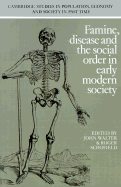Book contents
- Frontmatter
- Contents
- List of contributors
- List of figures
- List of tables
- Andrew Appleby: A personal appreciation
- A bibliography of Andrew B. Appleby's principal works in chronological order
- List of abbreviations
- 1 Famine, disease and crisis mortality in early modern society
- 2 The social economy of dearth in early modern England
- 3 Death in Whickham
- 4 The response to plague in early modern England: public policies and their consequences
- 5 Demographic crises and subsistence crises in France, 1650-1725
- 6 Markets and mortality in France, 1600–1789
- 7 Some reflections on corn yields and prices in pre-industrial economies
- 8 Family structure, demographic behaviour, and economic growth
- Consolidated bibliography
- Index
- Cambridge Studies in Population, Economy and Society in Past Time
5 - Demographic crises and subsistence crises in France, 1650-1725
Published online by Cambridge University Press: 01 June 2011
- Frontmatter
- Contents
- List of contributors
- List of figures
- List of tables
- Andrew Appleby: A personal appreciation
- A bibliography of Andrew B. Appleby's principal works in chronological order
- List of abbreviations
- 1 Famine, disease and crisis mortality in early modern society
- 2 The social economy of dearth in early modern England
- 3 Death in Whickham
- 4 The response to plague in early modern England: public policies and their consequences
- 5 Demographic crises and subsistence crises in France, 1650-1725
- 6 Markets and mortality in France, 1600–1789
- 7 Some reflections on corn yields and prices in pre-industrial economies
- 8 Family structure, demographic behaviour, and economic growth
- Consolidated bibliography
- Index
- Cambridge Studies in Population, Economy and Society in Past Time
Summary
In his essay, ‘Grain prices and subsistence crises in England and France, 1590-1740’, Appleby
attempts to explain why England had no food crises from 1650 to 1725, a period when France was unusually vulnerable to famines. During this time, oat and barley prices in England did not always increase following a failure of the wheat crop. In France, however, all grain rose in price simultaneously, leaving the poor with no affordable substitute grain when the wheat and rye harvests failed.
He argues
that in those regions where both winter and spring grains were grown – that is, northern France and most of England – a symmetrical price structure, in which prices of all grains increased significantly at the same time, and famine went hand in hand.
Appleby's arguments are impressive and the graphs accompanying his article show clearly that while the market price of spring grains at Norwich and Reading in the 1690s rose much less than the price of winter wheat, at Pontoise (thirty kilometers from Paris) the market prices of all grains remained closely correlated during the crises of 1661, 1693, 1709, and 1740.
We have absolutely no intention of challenging Appleby's general thesis. Rather, in this chapter we propose to examine whether there were any significant differences between France and England in their experience of major mortality crises between 1650 and 1725, and whether the correlation between mortality crises and high prices in France was absolutely clear, as supporters of the ‘subsistence crisis’ theory claim was the case.
- Type
- Chapter
- Information
- Famine, Disease and the Social Order in Early Modern Society , pp. 189 - 200Publisher: Cambridge University PressPrint publication year: 1989
- 17
- Cited by

